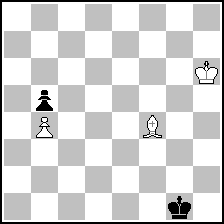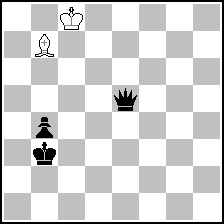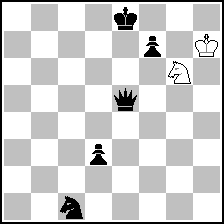|
|
| (1) Posted by Sarah Hornecker [Saturday, Dec 5, 2020 20:20] |
Longer Helpmate miniatures
"Secrets of Spectacular Chess" could use a third, revised again, edition. Many new masterpieces were created in the past twelve years. The book contains among others the following helpmate in 10:
 (= 3+2 ) (= 3+2 )
L. Zoltan
Miniature tourney, Tipographia TE 1969, 2nd prize
h#10
I leave you the opportunity to solve this. If you want to see the solution, you can mark the text below to make it visible. Apologies to users who use custom browser CSS where the text might already be visible.
Solution (disguised with hard bracketed "w"): 1.Kf2 Bc7! 2.Ke3 Kg5 3.Kd4 Kf4 4.Kd5 Ke3 5.Kc6 Kd4 6.Kb7 Kc5 7.Ka7! K:b5 8.Ka8 Kc6 9.Ka7 Bb6+ 10.Ka6 b5 mate
This is absolutely marvelous. How every move is unique in such a setting is masterful.
Do you know of other such "spectacular" miniature helpmates that don't necessarily rely on promotions, but still offer interesting play? If we use a minimum of five moves and allow promotions if other content exists, this (from the same book) just barely qualifies also:
 (= 3+3 ) (= 3+3 )
W. Anderson
The Problemist 2006
h#5
Solution: 1.c1Q Bf6 2.Be5 Bh4 3.Kd4 d3 4.Qh1 Kc2 5.Qd5 Bf2 mate
Do you know other good longer helpmate miniatures?
|
|
| (2) Posted by shankar ram [Sunday, Dec 6, 2020 04:41] |
Such h#s are the playground for Torsten Linss and Viktoras Paliulionis!
|
|
| (3) Posted by shankar ram [Sunday, Dec 6, 2020 04:46] |
Here are two samples:
https://www.yacpdb.org/#430651
https://www.yacpdb.org/#418806
|
|
| (4) Posted by Jakob Leck [Sunday, Dec 6, 2020 13:34] |
Really depends on the length and content you are after. Some examples could be
https://pdb.dieschwalbe.de/P0564861
https://pdb.dieschwalbe.de/P1296359
https://pdb.dieschwalbe.de/P1307390
https://pdb.dieschwalbe.de/P1366851
I think if you look through the pdb with something like STIP='h#[567891]' AND APIECES<8 AND NOT G='Fairies' AND NOT G='Retro' AND (ORIGINALYEAR='201_' OR ORIGINALYEAR='2020' OR ORIGINALYEAR='200[56789]') you will find plenty of material. 1960 problems, it can only take a couple of days... ;)
Edit: Without the restriction to the last 15 years it's about 5,5k problems.
|
|
| (5) Posted by Michael McDowell [Sunday, Dec 6, 2020 13:40] |
Viktor Zheglov
1HM Suomen Tehtäväniekat 1998-99
 (= 2+3 ) (= 2+3 )
H#12
1.Kc4 Ba6+ 2.Kd5 Kb7 3.b3 Kb6 4.b2 Kb5
5.Ke4+ Kc4 6.Kf3 Kd3 7.Kg2 Kd2 8.Kh1 Be2
9.b1S+ Ke1 10.Sd2 Kf2 11.Sf3 Bf1 12.Sh2 Bg2
A wonderful problem with remarkable timing. I was the tourney judge. The problem was one of 70 in an article by Zheglov, who had written a program which would take any combination of 5 pieces and generate the longest possible sound helpmate using that force. 69 of the problems were rubbish, just sequences with no content. At the time I wondered how to reward a composer whose “composing skill” consisted of writing a computer program. In the end I placed it second in the award. Today I’d place it first. I take the view now that it’s the problem that is being rewarded irrespective of how it was composed. Thankfully award designations are irrelevant. It’s the problem that matters.
|
|
| (6) Posted by Guus Rol [Sunday, Dec 6, 2020 20:48] |
What we can learn from this is that there is no point in constructing long helpmates with this material. All we could come up with is a rubbish problem or an anticipation ;-)
|
|
| (7) Posted by Frank Richter [Sunday, Dec 6, 2020 21:32] |
Precisely "... no point in constructing longEST helpmates ..." ;)
|
|
| (8) Posted by Andrew Buchanan [Monday, Dec 7, 2020 05:07] |
Cool problem: thanks for posting Michael, together with the interesting context.
If I was prospecting for gold, I might come across a valley which looked promising... until I saw that the earth had already been turned over by some previous miner. In the chess world, we don't have that clue that Someone's Been Here Before. Of course if the previous explorer found a treasure, they would probably have published it. But this is something different: a kind of anti-anticipation (pation?) where it would be valuable to publish negative results: "I have explored here with my strip-mining software and beyond what I've published, there is nothing else." Three is no real mechanism for propagation of this valuable negative information. The same is true in the scientific world: hard to publish negative results, but in principle they are nearly as valuable as positive ones. Ultimately maybe there will be a central AI that handles the big data of chess problems, with automatic optional feeds of all results positive & negative from all solution engines, big and small. In the meantime, I only have the fear of anticipation, not the knowledge of pation, to drive me forwards in search of fresh valleys, fresh design space...
|
|
| (9) Posted by Juraj Lörinc [Monday, Dec 7, 2020 07:51] |
In these days of Internet (and thus already for many years), self-publishing comes handy. Some completely searched valleys are described e.g. in books of Václav Kotěšovec, the best list being at
http://www.kotesovec.cz/links0.htm#ebookscz
Books and descriptions are largely in Czech language, but usually there is enough English text to get the idea.
|
|
| (10) Posted by Andrew Buchanan [Monday, Dec 7, 2020 08:57] |
Hi Juraj, that's a very useful link thank you, but just one. It's not practical to search the internet for "pation" data, just as it's not practical to search the internet for anticipations, but for the latter we have databases we can consult, particularly WinChloe. For example, look how accidental is contact with the welcome report by Michael. And even then, it doesn't give the exact details of what was scoured. I think this resource, for various reasons, will never exist, but it's a real hole as computer strip-mining becomes more prevalent. Maybe for miniatures, it's about defining new interfaces on the tablebases. In certain areas of composition, it's time to turn the lights on.
|
|
| (11) Posted by Frank Richter [Monday, Dec 7, 2020 17:18] |
I remember this problem by Bo Lindgren, it was extremely difficult to solve:
Bo Lindgren
8161 feenschach 08-09/2000
Commendation
 (= 2+5 ) (= 2+5 )
h#5.5
|
|
| (12) Posted by Nikola Predrag [Monday, Dec 7, 2020 17:42] |
Hm...about 10 seconds for solving :-)
Obviously very lucky first guess turned to be right.
|
|
| (13) Posted by Jakob Leck [Monday, Dec 7, 2020 18:13] |
20 seconds... :) The positioning of the Sc1 realtive to the Pf7 is highly suspicious. Nice problem though.
|
|
| (14) Posted by Alain Villeneuve [Monday, Dec 7, 2020 21:05] |
Too bad : 45 seconds !
|
|
| (15) Posted by Juraj Lörinc [Monday, Dec 7, 2020 23:32] |
As a running joke in the Slovak composing circles goes: It is a very good problem, I was unable to solve it!
|
|
| (16) Posted by Rosie Fay [Tuesday, Dec 8, 2020 10:24] |
Siegfried Hornecker: Thank you for posting László Zoltán's h#10. A companion to Endre Szentai's h#10.5 with the same material (Magyar Sakkélet 1958, P0577820).
Michael McDowell: 'a composer whose “composing skill” consisted of writing a computer program.'
There is a lot more to that composer's skill which that statement fails to acknowledge. There is also the chess problem knowledge which the composer must learn and use, to know how to use the program -- something akin to knowing what key terms to put into a search engine to best elicit what you're looking for. Then there is the art of filtering the program's output and judging each result, with the ultimate aim of deciding which problem to submit.
Finding the longest sound helpmate that starts with given material is rather a technical search. But how about making your program count occurrences of a chess prenomenon which is already acknowledged as a good feature in a problem? For helpmates there are, for instance:
* black moves to shield  from a black piece from a black piece
* white moves to shield  from a black piece from a black piece
* ditto with colours swapped
* switchback; tempo loss (even better if both sides must lose a tempo but paradoxically there is no shorter solution)
* white sacrifice (paradoxical; if White doesn't need it for the mate why's it needed for the play?)
Helpmates have the disadvantage that a solution line has only a main line with no branches. But it's acceptable to have multiple solution lines. So, for given material, what's the longest sound helpmate with
* n equal-shortest solution lines, with distinct keys, ending in distinct ideal/model/pure mates? or just distinct mates?
* 2 mates with  positions as far apart as possible? positions as far apart as possible?
* (chamaeleon) echo mates
This has been rather a long message but the gist is that there is more to use of a computer than merely finding the longest sound problem with given material with no further consideration of merit.
Is there little artistic merit in published problems that set length records for specified tasks, whose composers found them using computers? If so, then the fault is not composers' inability to use computers to find problems that humans value highly. Rather, it's the sacrifice of artistic merit on the altar of length task records.
|
|
| (17) Posted by Neal Turner [Tuesday, Dec 8, 2020 19:08] |
Knowledge of the aesthetics of chess problems doesn't necessarily translate to composing skills, while the ability to write computer programs is a different skill again.
So computer generated positions can be 'problematic' for any judge.
Maybe it depends on the context - I remember on an old thread Michel Caillaud, talking about one famous problem made with the computer, said that he would give it 4 points to go into the FIDE Album, but zero points if it was entered in the WCCI.
But it's more complex than just 'hand-made' versus 'computer generated' - recently I saw a h#3 with 5(!) white pieces on the board.
Obviously this would be completely impossible to get sound without a lot of help from the computer.
Also we could ask composers to put their hand up if they've never used a line shown to them by the computer when they've been testing their efforts.
I think we would all be very sceptical of those that did so.
In the end it's up to each composer to decide what it is they're in the game for - the Product or the Process.
Those for whom the product is most important then the computer is the obvious tool to make use of, even it involves no actual 'composing' at all.
But for some of us it is the actual composing process which attracts - I was so happy with my last problem - after working on it for a week it was correct first time when I finally showed it to the silicon monster!
|
|
| (18) Posted by Bojan Basic [Tuesday, Dec 8, 2020 20:22] |
QUOTE
Maybe it depends on the context - I remember on an old thread Michel Caillaud, talking about one famous problem made with the computer, said that he would give it 4 points to go into the FIDE Album, but zero points if it was entered in the WCCI.
Probably this: http://matplus.net/start.php?px=1607455287&app=forum&act=posts&fid=gen&tid=2065, post (70).
|
|
| (19) Posted by Hauke Reddmann [Tuesday, Dec 8, 2020 21:57] |
As the old adage (not necessarily on problem composing :-)
goes, "It's not your tool but how you use it".
Since ages I compose only at the computer (admittedly not
*with*) and I see only advantages. (I *do* have to bitch
that sometimes I have the impression that noodle soup
composers publish as soon the problem is correct and
shows the right letter combination, which is of course
greatly enhanced by a solving program, but maybe a few
perpetrators give the whole genre a bad name. Sometimes
I'm guilty of the same anyway.)
|
|
No more posts |
MatPlus.Net  Forum Forum  Helpmates Helpmates  Longer Helpmate miniatures Longer Helpmate miniatures |
 ISC 2024
ISC 2024 Forum
Forum  Helpmates
Helpmates  Longer Helpmate miniatures
Longer Helpmate miniatures 


